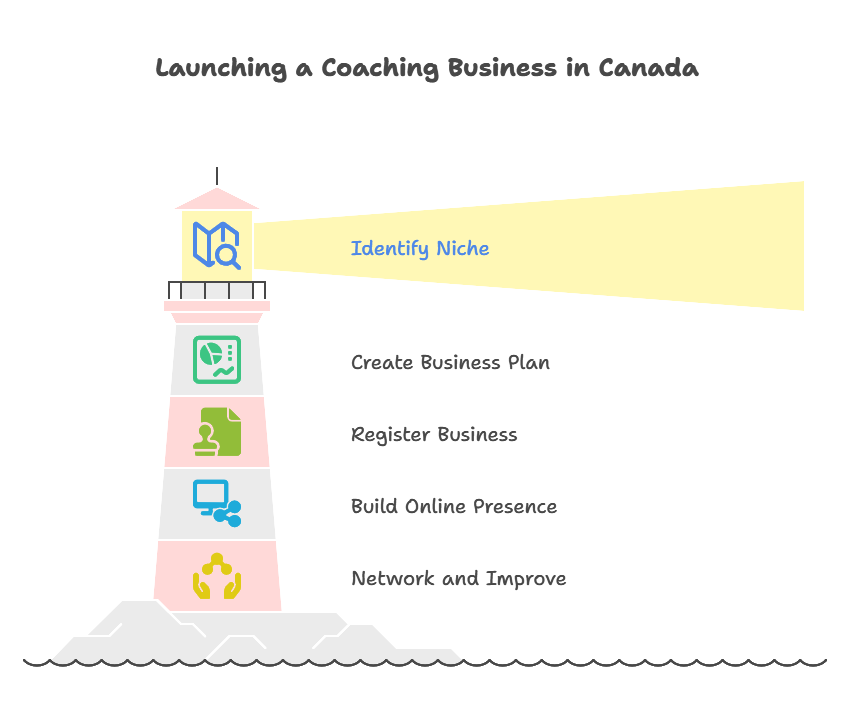Starting a coaching business in Canada requires choosing your niche, registering legally, setting up finances, building your brand, and finding your first clients. Most coaches begin as sole proprietors, then incorporate later as they grow. With demand for coaching services rising, now is the perfect time to turn your passion into a profitable business.
More Canadians are investing in coaching, whether it’s life coaching, business coaching, career, or wellness. If you’ve ever dreamed of helping others achieve their goals while building your own income and freedom, coaching could be your ideal business.
The good news? Starting a coaching business in Canada doesn’t require huge capital or years of experience. What you do need is a clear plan, the right mindset, and smart steps to set up and grow your practice.
This guide will walk you through everything you need to know to launch successfully, from defining your niche to getting your first clients.
Step 1: Define and Validate Your Coaching Niche

Choosing the right niche is the foundation of building a successful coaching business in Canada. Your niche not only shapes your services but also determines the kind of clients you attract and the income potential you can create. Without a clear focus, it’s easy to get lost in a crowded market.
Popular Coaching Niches in Canada
- Life Coaching – Helping clients build confidence, improve relationships, and strengthen their mindset.
- Business & Leadership Coaching – Supporting entrepreneurs, executives, and managers to improve decision-making, leadership, and organizational growth.
- Health & Wellness Coaching – Guiding clients toward better nutrition, fitness, stress management, or holistic well-being.
- Career Coaching – Assisting professionals with job transitions, skill development, and career advancement.
How to Validate Your Coaching Idea
Before committing, test if there’s real demand for your coaching services:
- Talk to Your Audience – Ask potential clients about their struggles through surveys, polls, or direct conversations.
- Offer Trial Sessions – Run free or low-cost introductory sessions and gather feedback.
- Pre-Sell Packages – Launch a waitlist or offer discounted pre-sale coaching packages to measure interest.
- Run Small Ad Campaigns – Use Facebook or Instagram ads with a minimal budget to see if people engage with your offer.
- Check Online Communities – Look at forums, Facebook groups, or LinkedIn discussions to identify what problems people want solved.
Step 2: Choose the Right Business Structure

Your structure affects taxes, liability, and growth.
Sole Proprietorship
- The easiest and most affordable way to start.
- You have full control over business decisions.
- Downside: you’re personally liable for debts or legal claims.
- Best for coaches just starting out or testing their niche
Partnership
- Involves two or more people sharing ownership.
- Requires a clear written agreement outlining roles, profit-sharing, and responsibilities.
- Liability is shared, so trust and legal clarity are essential.
- Good choice if you’re launching with a co-coach or business partner.
Corporation
- Treated as a separate legal entity, which means your personal assets are protected
- Offers potential tax benefits and more credibility with clients and organizations.
- More paperwork, regulations, and setup costs.
- Ideal for coaches planning to scale, hire employees, or offer group programs.
Step 3: Register Your Coaching Business in Canada
Make your business official:
- Register your business name with your provincial registry.
- Get a Business Number (BN) from the CRA.
- Register for HST/GST if your income exceeds $30,000 annually.
- Confirm if any permits apply (most coaching services don’t need special licensing).
Step 4: Set Up Finances and Operations
Smooth operations prevent stress later.
- Open a business bank account to separate finances.
- Use accounting software (Wave, QuickBooks).
- Consider professional liability insurance.
- Track all expenses and income for tax purposes.
Step 5: Build Your Coaching Brand
A strong brand helps attract and retain clients.
- Choose a clear business name and logo.
- Build a professional website with online booking options.
- Share expertise via blogs, webinars, or social media tips.
- Create a free resource (e.g., eBook, checklist) to grow your email list.
Step 6: Get Your First Coaching Clients
Without clients, there’s no business. Start lean and focused.
- Offer a free discovery call to build trust.
- Leverage your network and referrals.
- List on coaching directories and Google Business Profile.
- Use social media ads to target your niche audience.
- Collect testimonials even from early or trial clients.
Step 7: Scale and Grow Your Coaching Business

Once established, think long-term.
- Raise prices as demand increases.
- Offer group coaching programs or online courses.
- Automate scheduling, payments, and email follow-ups.
- Partner with businesses or other coaches.
- Keep investing in certifications and professional growth.
Final Thoughts
Starting a coaching business in Canada is both rewarding and profitable if done right. By choosing the right niche, setting up legally, creating a brand, and focusing on client results, you can build a thriving practice.
Success won’t happen overnight, but with consistency and value-driven service, your coaching business can become your full-time career.
FAQs
Do I need a license to start a coaching business in Canada?
No, coaching is unregulated in Canada. However, certification from organizations like ICF (International Coaching Federation) can boost credibility.
How much does it cost to start a coaching business?
You can start with as little as $500–$2,000 for essentials like a website, branding, and marketing. Costs rise if you pursue certifications.
How can I get coaching clients fast?
Leverage your network, offer free discovery calls, promote services on LinkedIn or Instagram, and collect testimonials early to build trust.
Is coaching in demand in Canada?
Yes. With increasing focus on personal growth, leadership, and wellness, demand for professional coaches continues to grow across industries.





